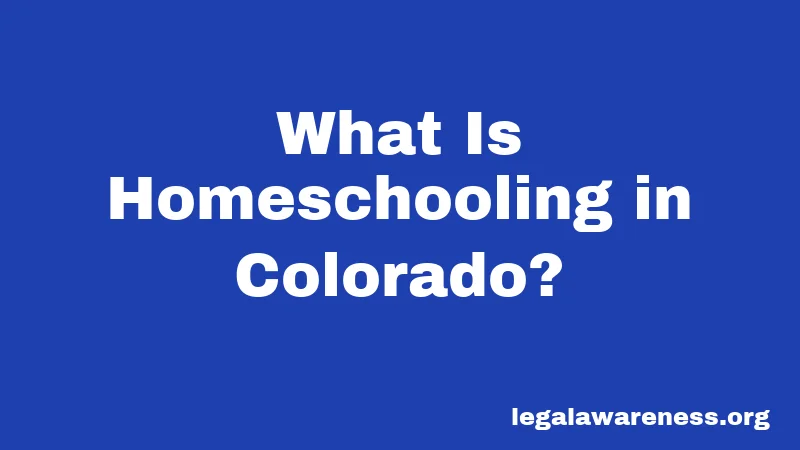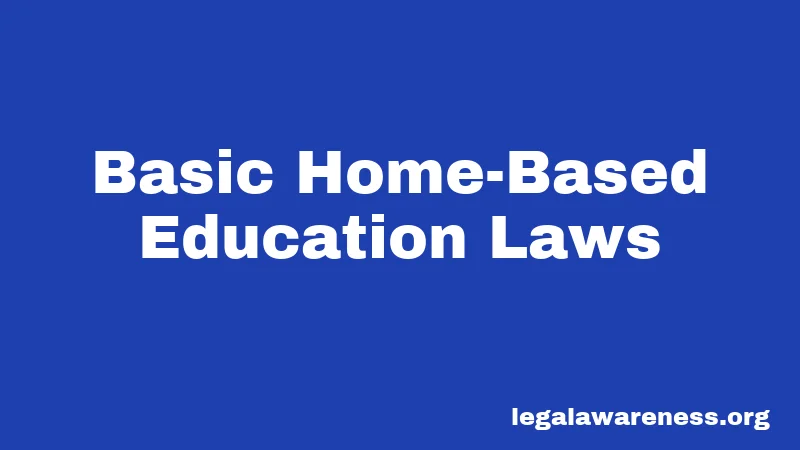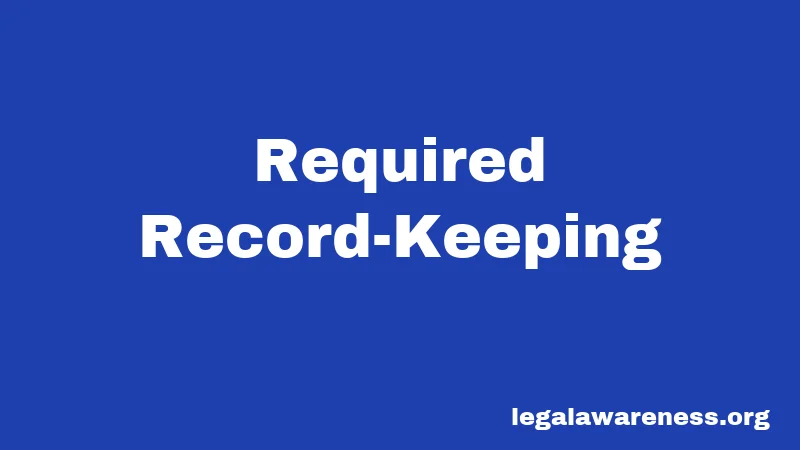Colorado Homeschool Laws in 2026: Your Complete Guide to Getting Started
Most people don’t realize how flexible Colorado actually is when it comes to homeschooling. Seriously. The state gives families real options and doesn’t bog you down with endless red tape. But there are rules you need to follow. Let’s break down everything you need to know before you start teaching your kids at home.
Whether you’re a first-time homeschooler or moving to Colorado, understanding the law makes everything simpler. Trust me, spending 20 minutes reading this now saves headaches later.
What Is Homeschooling in Colorado?

Homeschooling in Colorado means your child gets educated at home instead of attending public school. The parent (or a designated adult relative) teaches the child. It’s considered a legitimate educational choice. Colorado law doesn’t treat it as a loophole—it’s a real option.
The law actually says this pretty clearly: parents have the “primary right and obligation” to choose their child’s education. Homeschooling is one way to do that. Pretty straightforward, right?
Colorado’s Three Homeschool Options
Here’s something important: Colorado doesn’t force you into one method. You have three different legal pathways. Pick the one that fits your family best.
Option 1: Home-Based Education (The Traditional Path)
This is probably what you picture when you think of homeschooling. You take full responsibility. You pick the curriculum, teach the lessons, keep records, and test your kids. You do file paperwork, but it’s minimal. This is the most common choice.
Option 2: Umbrella Schools (The Supported Path)
An “umbrella school” is a private school that lets families teach from home under their supervision. You’re technically enrolled in a school, so you don’t file paperwork with your local district. The school handles some of the administrative work. Some umbrella schools offer curriculum, testing, and support services. It costs money, but some families love the extra support.
Option 3: Certified Teacher (The Simple Path)
If you (or whoever teaches your kid) holds a valid Colorado teaching certificate, the rules basically disappear. No paperwork. No testing. No reporting. The certified teacher takes full responsibility.
Most families choose Option 1. It’s the most affordable and gives you the most freedom.
Basic Home-Based Education Laws

Submitting a Notice of Intent
Okay, this part is crucial. You must file a Notice of Intent (NOI) with a Colorado school district before you start. Not with the state. With your district.
Here’s what you need to do: Submit the letter at least 14 days before you begin. Not 13 days. Fourteen. Write down the child’s name, age, where they live, and how many hours they’ll attend each day. Then mail it certified mail to your school district superintendent.
Not sure which district to use? You can file with any district in Colorado. Don’t overthink it. Pick the one nearest you.
You need to resubmit this letter every single year. It’s not a one-time thing. Mark your calendar now so you don’t forget.
Instruction Time Requirements
Colorado doesn’t mess around here. Your child needs 172 days of school per year. That’s about 34 weeks. Each day must average four hours of instruction.
Sound like a lot? Let me break it down. Some days might be five hours. Other days might be three. As long as they average out to four hours per day, you’re good.
A word of advice: keep detailed attendance records. Track the actual hours. If a school district ever asks, you need to prove you hit that 172-day requirement.
Required Subjects
The state requires you to teach specific subjects. Here’s the full list:
Your child must learn reading, writing, speaking, math, history, civics, literature, and science. The law also specifically requires instruction on the U.S. Constitution. These aren’t suggestions—they’re requirements.
The good news? You have total freedom on how you teach them. Textbooks, online courses, documentaries, field trips—whatever works for your family. As long as they’re learning these subjects, Colorado is happy.
Assessment and Testing Requirements
When Testing Happens
Not every year. Testing happens at specific grade levels: 3rd, 5th, 7th, 9th, and 11th grade. Your child gets assessed in these grades only.
Wondering what this means? It means you have time to breathe between tests. You’re not constantly proving your child’s progress.
Two Ways to Assess
You have a choice here. Your child can either take a nationally standardized achievement test (like the SAT or ACT) or get evaluated by a qualified person. It’s your call.
If you pick the standardized test route, it’s straightforward. Your child takes the test. You submit the score to the school district where you filed your NOI.
If you pick the evaluation route, you hire someone qualified to assess your child. “Qualified” means they hold a Colorado teacher license, work at a private school, have a master’s degree in education, or are a licensed psychologist. They evaluate your child’s progress and write a report.
Need the score to mean something? Your child must score above the 13th percentile on a standardized test. If someone evaluates them, they just need to show they’re making sufficient progress according to their ability. It’s not about being perfect.
Where to Submit Results
You submit test or evaluation results to the school district where you filed your NOI. Or you can submit them to an independent or parochial school in Colorado. The choice is yours.
Hold on, this part’s important: you only need to do this once per grade level when they’re tested. You’re not constantly reporting.
Required Record-Keeping

The state requires you to keep records. But here’s good news: it’s not as intense as you might think.
You need to maintain:
Your child’s attendance records (which days they attended and for how long). Test scores or evaluation results from grades 3, 5, 7, 9, and 11. Immunization records for your child. A list of curriculum and course materials you used.
Keep these records permanently. Seriously. Store them somewhere safe, like a portfolio or folder. The school district can request to see them if they have “probable cause” to believe you’re not following the law. In practice, this rarely happens.
Here’s a pro tip: if your child might apply to college, keep their work samples and transcripts too. Colleges want to see what your kid actually learned, not just test scores.
Special Situations and Exceptions
What If Your Child Was Truant Before?
If your child was “habitually truant” at public school (meaning they missed too much), the school district might ask for more information before you start homeschooling. Specifically, they can request a curriculum outline.
Is this a dealbreaker? No. But it means you’ll need to show your plan. Have a curriculum picked out and documented before you file your NOI.
Can Homeschoolers Participate in Public School Activities?
Yes. Colorado law says homeschooled children can participate in sports, clubs, and other extracurricular activities at public schools on an equal basis with public school students. You have the right to ask.
Some schools make this easier than others. Your local district decides where students participate if there are multiple schools. But the bottom line? Your homeschooler can join activities.
Attending Public School Part-Time
Your child can attend public school for part of the day and homeschool for the rest. The district counts them for enrollment if they’re there during official attendance periods. You still need to file an NOI and meet homeschool requirements for the hours at home.
Honestly, this is becoming more common. Some families do a hybrid approach. It works well if you want some support but still want flexibility.
Vaccination and Health Requirements
Colorado requires all students—including homeschoolers—to be vaccinated against certain diseases. The state follows national guidelines on which vaccines are required.
You can request exemptions for medical or personal reasons. But if you’re part of a public school system at all, this rule applies. Talk to your doctor if you have questions about specific vaccines.
Setting Up Your Homeschool
Choosing Curriculum
Colorado doesn’t approve or recommend specific curricula. You pick whatever works for your family. Online programs, textbooks, workbooks, documentaries—it’s all fair game.
The only requirement? It has to cover the required subjects. And your child’s progress should be comparable to kids in regular schools.
This freedom is actually amazing. You can tailor everything to your child’s learning style. Some kids love structure. Others thrive with flexibility. You get to decide.
Creating a School Schedule
Many Colorado homeschoolers school year-round but in shorter blocks. Others do traditional September-to-May. Some unschoolers follow their child’s interests without a fixed schedule.
The law doesn’t care which you choose. It just cares that you hit 172 days and four hours per day on average. How you arrange those hours is totally up to you.
Personally, I think this flexibility is the best part of homeschooling. Your schedule can adapt to your family’s actual life.
Building a Portfolio
Create a folder (physical or digital) with your child’s best work, assignment samples, and reflections. This becomes valuable proof of learning. It’s especially helpful if you ever need to show the school district what your child has been doing.
You don’t need to include everything. Just representative samples that show progress throughout the year.
Getting Support and Finding Community
Colorado has active homeschool organizations that provide support groups, field trips, curriculum advice, and networking. The two biggest are Christian Home Educators of Colorado (CHEC) and Colorado Home School Network.
These groups often coordinate co-ops where families teach together. They host field trips, science fairs, and social events. Many offer curricular support too.
Are you feeling isolated? Join a group. Seriously. The support changes everything. Other homeschooling families have already solved the problems you’re facing.
Graduation and High School
Here’s something amazing: Colorado doesn’t have state-mandated graduation requirements for homeschoolers. You set the requirements based on your child’s post-high school plans.
Going to college? You decide which credits and courses prepare them. Going straight to work? You make that choice. This freedom is incredible.
When your student finishes, you sign a diploma. It’s legally recognized in Colorado. Colleges accept it. Employers accept it. You can order a professional diploma if you want, but the one you create works just fine.
Do you need to issue transcripts? It helps, especially for college applicants. Keep a record of courses taken, grades earned (if you use them), and any standardized test scores.
If the School District Contacts You
The school district can only request your records if they have “probable cause” to believe you’re not following the law. If that happens, they must give you 14 days’ notice.
What counts as probable cause? If they think you haven’t hit the 172-day requirement or that your child hasn’t been assessed. In reality, this rarely happens.
If you ever get contacted, stay calm. You have rights. Keep your records organized and be honest. Most issues get resolved quickly.
What You DON’T Need to Do
Let me be clear about what Colorado does NOT require:
You don’t need a high school diploma yourself. You can homeschool without any teaching certification or education degree. You don’t need to use approved curricula. You don’t need a lesson plan approved by anyone. You don’t need to follow a specific schedule. You don’t need to teach in traditional subjects only. You don’t need to keep a detailed lesson log (though attendance records are required). You don’t need permission from the school district before you start (just notification).
The state trusts parents. That’s the whole philosophy. As long as you’re teaching the required subjects, hitting the days and hours, and assessing your child, you’re good.
Frequently Asked Questions
What age can my child start homeschooling? Colorado requires education from ages 6 (by August 1st) through 17. But if you’re doing a home-based education program, the law applies to kids between ages 7 and 16. You have flexibility with the actual ages depending on your path.
Can I homeschool multiple children together? Absolutely. You can teach several kids at once. Just file an NOI listing all of them. Each child needs to be tested according to their grade level, but you can absolutely have one homeschool for multiple kids.
How much does homeschooling cost? It depends on your choices. Some families spend under $500 per year on simple curricula and testing. Others spend thousands on online programs and co-op fees. Colorado doesn’t fund homeschooling directly, so budget accordingly.
Do I need to follow Colorado Academic Standards? Colorado Academic Standards exist for reference. They show what public school kids learn at each grade level. Using them as a guide helps ensure your child stays on pace with peers. But following them exactly isn’t required.
What happens if I don’t follow the law? If you’re not meeting requirements, the school district might ask for proof. Keep good records and you won’t have issues. If you truly aren’t following the law and refuse to correct it, they could pursue truancy, but this is extremely rare.
Can my homeschooled child take college classes? Yes. Many Colorado colleges allow dual enrollment for high schoolers, including homeschoolers. Some offer online classes. Check with local colleges about their specific policies.
What if my child wants to return to public school? They can transfer anytime. Some districts seamlessly accept homeschooled kids and place them based on assessment. Others might require testing. Contact your district ahead of time to ask about their process.
Do I need to teach school year-round? No. Many homeschoolers take summers off. Some school year-round in shorter blocks. The law just cares about 172 days total. Spread them however you want.
Final Thoughts
Colorado gives homeschooling families real freedom with reasonable structure. You’re not drowning in bureaucracy, but you do need to follow basic requirements. The 172-day minimum, required subjects, and periodic assessments exist for good reasons—they keep your child accountable.
The bottom line? Colorado expects you to take homeschooling seriously. File your paperwork on time. Keep good records. Teach the required subjects. Assess your child when the law requires it.
Do those things, and you’re golden. You’ll create an education that actually fits your child instead of forcing them to fit an education. That’s the whole point.
Start with official resources, connect with local support groups, and don’t hesitate to reach out to your school district with questions. Most districts want families to succeed.
Now you know the basics. Stay informed, stay organized, and when in doubt, check the official Colorado Department of Education website or ask your school district superintendent.
References
- Colorado Department of Education Homeschool Resources – Official state resources and information
- Colorado Revised Statutes § 22-33-104.5 – Full text of Colorado homeschool law
- Christian Home Educators of Colorado (CHEC) – Detailed law summary and support organization
- Home School Legal Defense Association – Colorado – Legal resources and compliance guidance
- Homeschool Treasury – Colorado Law Summary – Practical guide to requirements
